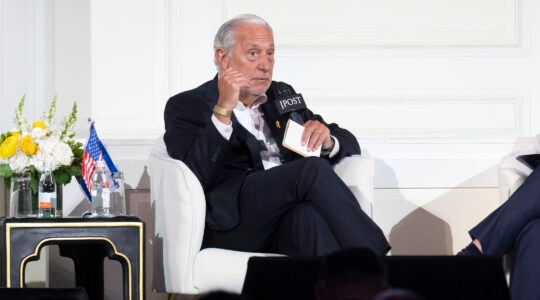The Hillel event I previously mentioned featured a panel discussion on the home’s east lawn between Randall Kaplan, the chairman of Hillel’s International Board of Governors, and Kathy Manning, the chairwoman of the Jewish Federations of North America.
Not a bad lineup. And that’s before you even get to the fact that they also happen to be married.
Others might spend more money on Jewish endeavors, but from their seat in something of a remote part of the Jewish world (Greensboro, N.C.), they are the top lay leaders at two of the Jewish world’s most significant organizations. Think of them as the Jewish nonprofit world’s true power couple.
In a few days I will be publishing an in-depth profile on Kaplan, who said in a lengthy interview at the Ritz Carlton in Manalapan over breakfast Tuesday that the couple spends about 70 percent of their private time talking about the Jewish world — to the point that it is actually hard for them to put the subject to rest even on vacations.
Their conversation Monday with Hillel’s donors shows that even though they run two very different organizations, they are faced with essentially the same problem: figuring out how to engage the next generation of young Jews.
According to Manning, who took over as the Jewish Federations’ chairwoman back in the fall, the federations are looking at four components of the challenge of connecting with younger Jews:
- Jews now are on the move. While it might have been a given in the past that Jews either would stay where they were or move to one of the large U.S. cities that have major Jewish populations like New York, now it seems more of them are moving west and south to communities that do not have great Jewish infrastructure.
- Young people these days also have far more choices than they ever did, and they are less concerned about their survival as Jews than their grandparents might have been. While in the past Jews might have found a common bond because their Judaism in an anti-Semitic world put them in the same boat and made them need each other, now the broader American society generally embraces Jews and has made cultural Jewish staples its own. “The mainstream is embracing and marrying our children,” she said.
- Young people feel more individualistic and entitled than they ever have in the past, she said. They are no longer willing to join organizations and wait to take their place at the table. Instead they will find another table that suits their needs.
- Young people don’t feel an innate connection with Israel anymore.
Over at Hillel, Randall Kaplan is working with the organization to figure out how to connect with the estimated 400,000 Jewish young adults who are on college campuses at any given time.
The organization is essentially raising the bar for what qualifies as a successful Hillel: “We used to talk about how to connect with 30 percent of kids on campus," he said. "Now we are trying to figure out how to get to 60 percent."
It’s a tough goal, especially because so many college students now come to campus with little or no Jewish background. For that same reason, Hillel is increasingly seen in some communal circles as the last, best chance for helping many young adults find a way to engage in Jewish life.
"We have to be very sophisticated in the way that we approach them and come to the table with a broad spectrum of opportunities," Kaplan said. "Many come from interfaith families and are exploring how they want to be Jewish. For others, the fire is not lit. We are the Jewish community center on campus. It’s the place we have to think about how to inspire people.”
JTA has documented Jewish history in real-time for over a century. Keep our journalism strong by joining us in supporting independent, award-winning reporting.





